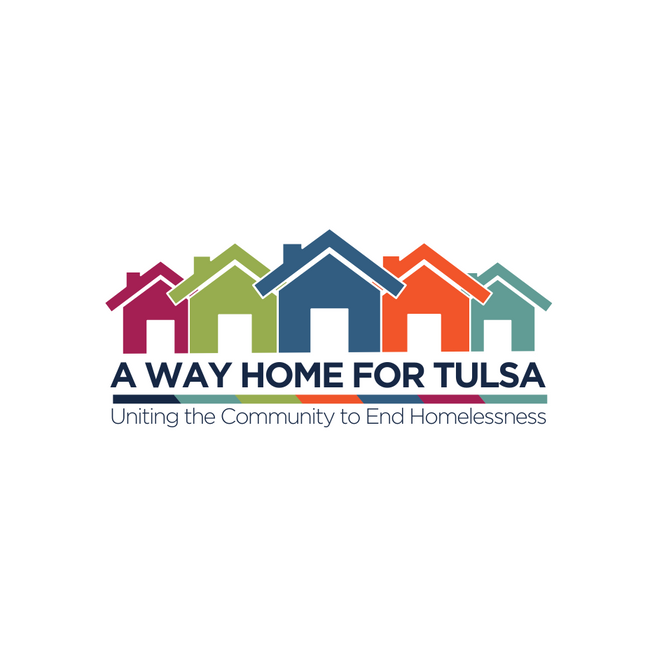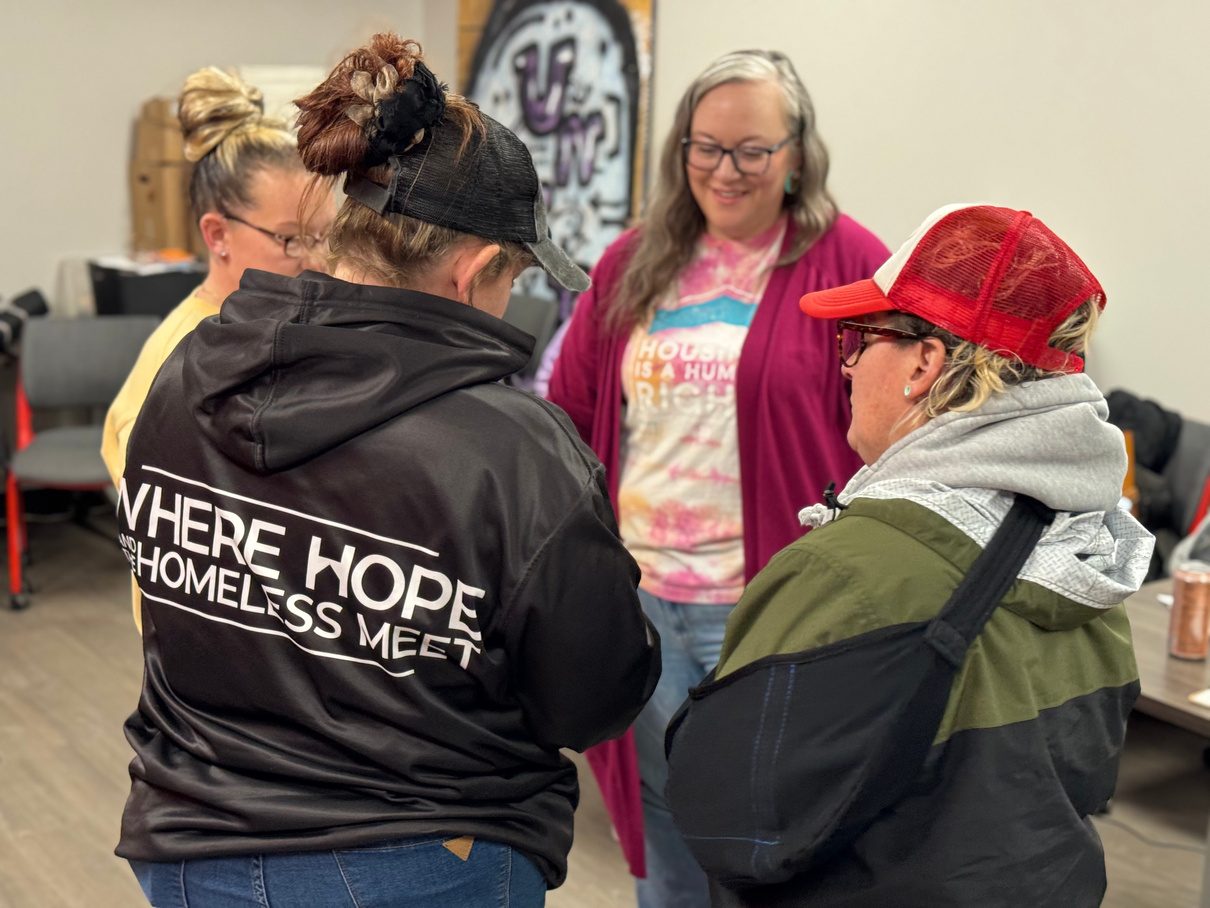A Way Home for Tulsa
partnership information

A Way Home for Tulsa is a coalition of more than 50 organizations that collaborate to address homelessness in Tulsa County. We work together to provide resources and support to individuals experiencing homelessness in Tulsa County, aiming to help them regain stability in their lives.
Housing Solutions serves as the Lead Agency and administrator of the Homeless Management Information System (HMIS) for A Way Home for Tulsa. We invite all agencies committed to preventing and ending homelessness in our region to become partners, free of charge.
Partnership Information
Partnership for A Way Home for Tulsa is always open. Partner agencies work together to implement programs to end homelessness in our community. Our programs are based on a Housing First model. This model means that Tulsans experiencing homelessness are moved into housing as quickly as possible and then provided with supportive case management services and any mental or physical health services they might need to help them stabilize in housing.
AWH4T Partnership certifies that an organization supports the following goals:
- Promote community-wide commitment to the goal of preventing and ending homelessness.
- Provide access to funding for local nonprofit providers and governmental entities that implement strategies to rapidly re-house individuals and families experiencing homelessness while minimizing the trauma and dislocation for those individuals, their families, and the local community.
- Promote access to and effective use of mainstream programs by individuals and families experiencing homelessness.
- Optimize self-sufficiency among individuals and families experiencing homelessness.
- Orchestrate a vision for preventing and ending homelessness in Tulsa County.


Benefits of CoC Partnership
- Be a part of a network of public, private, and nonprofit members, working together to make the experience of homelessness in Tulsa County rare, brief, and non-recurring.
- Participate in the monthly Leadership Council meetings, vote on all-member decisions and resolutions, and nominate people for the Leadership Council.
- Participate in workshops, improve policies and practices, and make homeless services more efficient.
- Access to funding opportunities for your organization to house those experiencing homelessness.
Partnership Types
There are two types of partnerships in A Way Home for Tulsa.
If you provide direct services to people experiencing homelessness, join us as a Service Provider Partner. Service Provider Partners are committed to implementing the AWH4T Service Standards in their programming.
If you are an organization contributing to the homelessness response system, but not directly providing homeless services, join us as a Coalition Partner!

Not sure where you fit? Email us at info@housingsolutionstusla.org and we will help you decide.
Coalition Partner Organizations
Organizations that contribute to the homelessness response system without directly providing services to homeless individuals play crucial roles in supporting the infrastructure, policy development, funding, and overall strategy of the response system. Their work is vital in creating an environment where direct service providers can operate effectively
Foundations & Grant Making
These entities provide critical funding to homeless service providers through grants. They often focus on specific areas like housing, health, education, or employment, supporting projects and programs that address homelessness.
Research & Think Tank
By conducting studies and publishing data on homelessness, these organizations help to understand the scope, causes, and effects of homelessness. Their work informs policy, best practices, and public awareness efforts.
Advocacy Groups
These organizations work to influence public policy related to homelessness, housing, poverty, and related issues. They lobby for legislation, policies, and funding that address homelessness and support the rights and dignity of homeless individuals.
Professional Associations
Groups representing professionals in the field, such as social workers, housing developers, or healthcare providers, offer training, resources, and policy advocacy to improve the quality and effectiveness of homelessness services.
Corporate
Businesses contribute through funding, in-kind donations, and volunteer programs. They might sponsor events, donate products or services needed by homeless individuals or service providers, or engage in public awareness campaigns.
Community & Faith Based
While some provide direct services, others contribute by mobilizing volunteers, hosting awareness events, or fundraising. They play a key role in fostering community support and compassion towards individuals experiencing homelessness.
Educational Institutions
Schools and universities can be involved in the homelessness response through service-learning projects, research initiatives, and student-led programs that offer support to homeless populations or contribute to broader awareness and advocacy efforts.
Housing & Real Estate
Organizations focused on affordable housing development indirectly contribute to preventing and ending homelessness by increasing the availability of affordable living spaces. This can include both nonprofit and for-profit entities.
Media
By highlighting stories and issues related to homelessness, these contributors can shift public perception, increase awareness, and advocate for policy changes or community action.
Service Provider Organizations
Direct homeless services refer to the immediate and practical support offered to individuals and families experiencing homelessness. These services are designed to address both the urgent needs of those without shelter and the broader challenges of achieving long-term housing stability, and they are critical components of a comprehensive response to homelessness, aiming to meet immediate needs while facilitating a transition to stable, long-term housing solutions.
Street Outreach
Teams actively engage with individuals experiencing homelessness in public spaces, offering immediate support, information, and connection to emergency services.
Emergency Shelter
Temporary accommodation provided to individuals and families in crisis, offering a safe place to stay while accessing other support services.
Transitional Housing
A form of temporary housing that bridges the gap between emergency shelter and permanent housing, often accompanied by supportive services to prepare for long-term stability.
Permanent Supportive Housing
Long-term housing assistance combined with supportive services for individuals and families with chronic patterns of homelessness and complex needs, such as disabilities or mental health issues.
Rapid Rehousing
Programs that help individuals and families quickly exit homelessness and return to permanent housing through services like rental assistance, housing relocation, and stabilization services.
Case Management
Supportive services that help individuals and families navigate the complexities of the social services system, access necessary resources, and plan for long-term housing stability.
Job Training or Employment
Programs designed to improve the employment outcomes of homeless individuals by providing job training, resume building, job placement, and sometimes work-related clothing and transportation assistance.
Health Services
Direct access to medical, dental, and mental health care, often provided through mobile health units, health clinics, or partnerships with local health providers.
Substance Use Treatment
Services aimed at supporting recovery for individuals experiencing homelessness and substance use disorders, including detoxification, rehabilitation, and counseling services.
Legal Services
Assistance with legal issues that may be barriers to securing housing, such as eviction prevention, resolving outstanding warrants, obtaining identification documents, and more.
Education or Childcare
Support for families experiencing homelessness, including access to education for children and childcare services, to enable parents to seek employment or attend job training.
Nutritional Services
Provision of meals and nutritional support, often through soup kitchens, food banks, or meal delivery services to individuals and families facing homelessness.
Requirement for Service Providers
- Active engagement in homeless services and compliance with A Way Home for Tulsa Service Standards.
- Participation in task groups, data entry into HMIS, and adherence to Housing First principles.
Additional Benefit for Service Providers
- Service Providers receive free access to the Homeless Management Information System (HMIS), which is a local information technology system used to collect data from service providers serving individuals or households experiencing or at risk of homelessness. Housing Solutions provides HMIS access, training, and technical support to all service provider partners.

For your agency to become a Partner of A Way Home for Tulsa, the following is required:
- Complete the A Way Home 4 Tulsa Partnership Application
- Sign and submit the CoC Partnership Agreement(s) and Conflict of Interest Policy to confirm organizational alignment with the goals and policies of A Way Home for Tulsa. These will be sent to you after you submit your application.
- Sign up for A Way Home for Tulsa Newsletter to ensure that you and your agency receive timely communications from and about The Way Home regarding meetings, initiatives, workgroups, funding opportunities, and more.